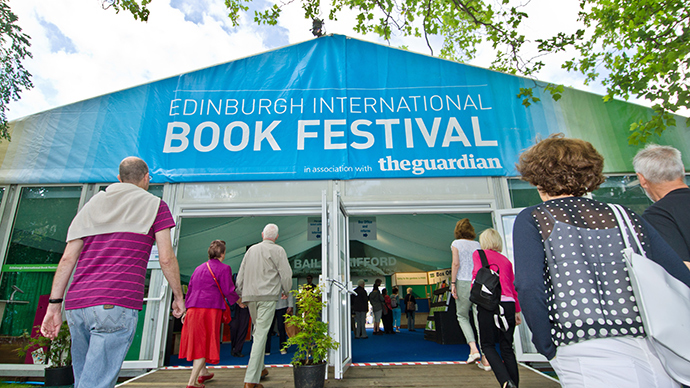Latest book trend talks about Russia’s ‘threat to the world’

People living in the West do not need their governments to remind them who their enemy is. Not when they have an obliging intelligentsia to do it for them.
For anyone who visits the annual and internationally renowned Edinburgh International Book Festival, a trip to the festival’s bookshop reveals, more than any number of speeches ever could from government ministers and leading politicians, who this year’s global pariah of choice is. Last year it was books on Syria and its “evil dictator” Assad that were doing the rounds, the year before that it was China, while the year before that Iran clogged the shelves.
This year it was no surprise to see the prevalence of books on Russia at the festival. I counted at least ten different titles, each making the case for regarding Russia as a threat to stability, security, and peace in the world. Covers included lurid pictures of Vladimir Putin, designed to depict the Russian leader as a dangerous maniac bent on global domination. The titles alone are revelatory.
For example:
-The New Cold War: Putin’s Threat to Russia and the West
-The Last Man in Russia: And the Struggle To Save A Dying Nation
-Fragile Empire: How Russia Fell in and Out of Love With Vladimir
Putin
-Red Fortress: The Secret Heart of Russia’s History
-The Strongman: Vladimir Putin and the Struggle for Russia
By now you should be getting the idea: Russia is the current focus of Western liberal commentators and an intelligentsia that extends itself in parroting the views of their own governments, abandoning their critical faculties in the process. While conformity may be the enemy of critical and independent thought, for such people it is a religion. Acceptance and respectability, after all, requires nothing less. How else are they to secure those newspaper columns, book deals, and invites to dinner parties and literary functions without which their lives would not be worth living?
The history of Western colonialism and wars of conquest is replete with its cheerleaders in the form of newspaper columnists, novelists, and writers. During the high water mark of the British Empire, Rudyard Kipling was its most famous chronicler. His most famous poem is White Man’s Burden, which he wrote as a celebration of the takeover of the Philippines by the United States in 1898.
“Take up the White Man's burden--
Send forth the best ye breed--
Go bind your sons to exile
To serve your captives' need;
To wait in heavy harness,
On fluttered folk and wild--
Your new-caught, sullen peoples,
Half-devil and half-child.”
In modern times the now departed British writer and journalist Christopher Hitchens was most prominent when it came to carrying on the tradition of providing literary and journalistic muscle for the projection of imperial power. From a withering critic of the West and Western foreign policy in the 70s and 80s, Hitchens underwent a slow but sure metamorphosis throughout the nineties. It reached its apogee after 9/11, when he enthusiastically embraced the wars unleashed by George W. Bush.

For him and other members of the liberal literati, US imperialism and militarism was suddenly a force for good and human progress in the world. The stealth bombers, Abrams tanks, battleships, aircraft carriers and legions of Kevlar-helmeted Marines which at one time stood for death and destruction in the name of US hegemony, now constituted the vanguard of the Enlightenment, spreading civilization and democracy to the dark peoples of the world.
Here was Hitchens’ advice to the US and British military leaderships, published in the pages of the UK’s Daily Mirror newspaper, just before the 2003 invasion of Iraq:
“The best case scenario is a rapid attack by precision-guided weapons, striking Saddam's communications in the first hours and preventing his deranged orders from being obeyed. Then a massive landing will bring food, medicine and laptop computers to a surging crowd of thankful and relieved Iraqis and Kurds. This could, in theory, all happen.”
Then, after the invasion, with the resulting slaughter and carnage at its height, Hitchens had this to say this during a speech he gave at Kenyon College, Ohio in 2004 on the destruction of Fallujah:
“The death toll is not nearly high enough... too many have escaped.”
Hitchens is merely the most prominent example of the intellectual and ideological bankruptcy of Western liberalism in recent times, the poster boy of an ignoble tradition reflected in the plethora of anti-Russian and anti-Putin books featured at this year’s Edinburgh Book Festival. As John Pilger wrote: “Many journalists now are no more than channelers and echoers of what George Orwell called the 'official truth'. They simply cipher and transmit lies.”
The British poet Humbert Wolfe put it better in the 1920s, when he wrote: “You cannot hope to bribe or twist (thank God!) the British journalist. But, seeing what the man will do unbribed, there's no occasion to.”
The statements, views and opinions expressed in this column are solely those of the author and do not necessarily represent those of RT.
The statements, views and opinions expressed in this column are solely those of the author and do not necessarily represent those of RT.













